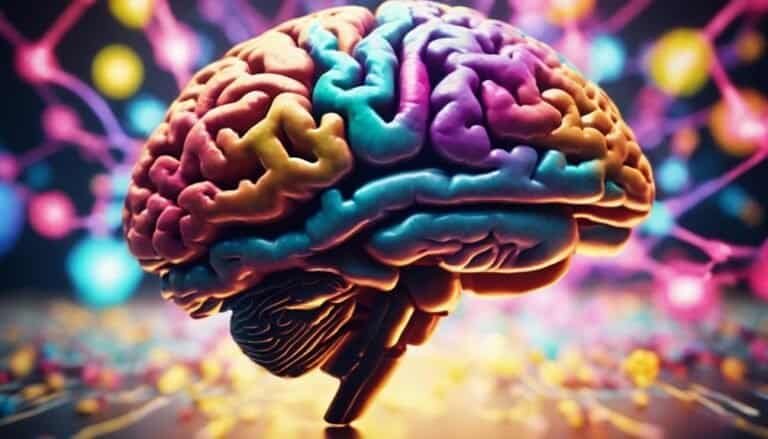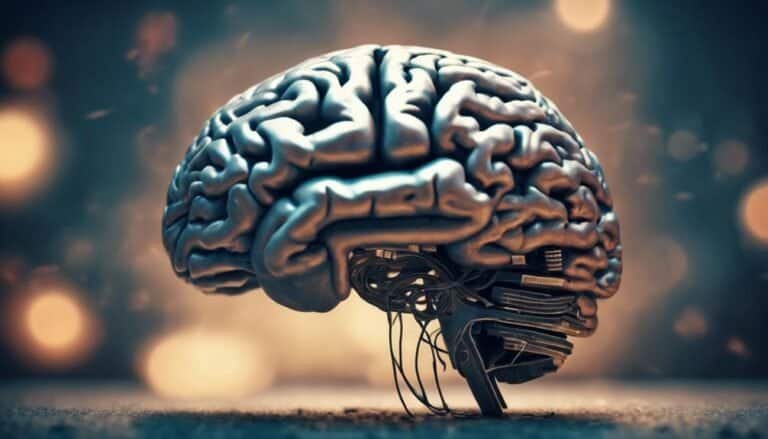Brain's Relationship With Physical Exercise
Have you ever wondered if there is a direct link between physical exercise and the functioning of your brain?
The correlation between staying active and cognitive abilities has been a subject of interest for researchers across various fields. Understanding how your workout routine impacts not just your body but also your brain may surprise you.
So, why not explore how a simple jog or a yoga session could be doing more for your mind than you think?
Key Takeaways
- Physical exercise enhances cognitive function and memory retention.
- Regular exercise stimulates neuroplasticity and neural growth.
- Elevated BDNF levels from exercise improve memory, attention, and problem-solving.
- Exercise promotes brain health, neuroprotection, and emotional well-being.
Benefits of Exercise on Brain Health
Engaging in regular physical exercise has been scientifically proven to enhance cognitive function and protect against cognitive decline. Neuroplasticity, the brain's ability to reorganize itself by forming new neural connections, is positively influenced by exercise. Physical activity promotes neuroplasticity by stimulating the growth of new nerve cells and enhancing synaptic plasticity, which are crucial for learning and memory processes. Additionally, exercise increases the levels of Brain-Derived Neurotrophic Factor (BDNF), a protein that supports the growth, function, and survival of nerve cells in the brain.
Studies have shown that higher fitness levels are associated with increased levels of BDNF, which in turn boosts cognitive abilities. Regular exercise not only elevates BDNF levels but also enhances the brain's capacity to adapt and learn. These neurobiological changes induced by physical activity contribute to improved cognitive function, including better memory, attention, and problem-solving skills. Therefore, incorporating exercise into your routine can have significant benefits for brain health and cognitive performance.
Effects of Physical Activity on Memory
When you engage in physical activity, your brain experiences improvements in memory functions. Exercise contributes to enhancing overall brain function, leading to cognitive benefits that can positively impact memory retention and recall.
The relationship between memory and physical activity underscores the importance of exercise in maintaining cognitive health.
Memory and Exercise
The integration of physical exercise into daily routines has shown a significant impact on memory retention and cognitive function.
Learning retention is notably enhanced through engaging in physical activities. Exercise plays a crucial role in memory consolidation, a process vital for storing and retrieving information effectively.
When you participate in physical activity, various mechanisms are activated in the brain that supports the formation of memories. These mechanisms involve the release of neurotransmitters like dopamine and norepinephrine, which are essential for memory encoding.
Additionally, physical exercise promotes neuroplasticity, the brain's ability to adapt and form new connections, further improving memory function.
Brain Function Improvement
Regular physical exercise enhances memory function by activating mechanisms in the brain that support memory consolidation through the release of neurotransmitters crucial for memory encoding. This process not only aids in memory retention but also contributes to mental clarity and focus.
When you engage in physical activity, such as aerobic exercises or strength training, you're promoting brain plasticity, which is the brain's ability to reorganize itself by forming new neural connections. These new connections are vital for learning and memory processes.
The release of neurotrophic factors during exercise plays a significant role in enhancing cognitive functions, including memory. By consistently incorporating physical exercise into your routine, you're actively stimulating your brain to improve memory function and overall cognitive abilities.
Cognitive Benefits of Exercise
Activating mechanisms in the brain through physical exercise supports memory consolidation and enhances cognitive function by releasing neurotransmitters crucial for memory encoding. Engaging in regular physical activity can significantly benefit your cognitive abilities.
Here are four key cognitive benefits of exercise:
- Focus Enhancement: Physical exercise can enhance your ability to concentrate and focus on tasks.
- Attention Improvement: Exercise helps improve attention span and cognitive performance.
- Learning Retention: Regular physical activity aids in retaining information and improving memory recall.
- Cognitive Flexibility: Exercise promotes cognitive flexibility, allowing you to adapt to new situations and tasks more effectively.
Incorporating exercise into your routine can have profound effects on your memory and overall cognitive function.
Role of Exercise in Neuroprotection
Engaging in physical exercise plays a crucial role in neuroprotection by promoting brain health.
The cognitive benefits of exercise are well-documented, showing improvements in memory, attention, and overall cognitive function.
Additionally, regular exercise is linked to better mental well-being, reducing the risk of neurological disorders and enhancing overall brain health.
Exercise and Brain Health
Exercise plays a crucial role in promoting neuroprotection and enhancing brain health. Regular physical activity has been linked to various cognitive benefits that can help improve overall brain function. Here are four key ways in which exercise contributes to brain health:
- Enhancing creativity: Engaging in physical exercise can stimulate the brain's creative processes by promoting the growth of new neural connections and enhancing cognitive flexibility.
- Improving focus: Physical activity has been shown to increase levels of neurotransmitters like dopamine and norepinephrine, which play a crucial role in enhancing focus and attention.
- Reducing oxidative stress: Exercise helps in reducing oxidative stress in the brain, which can protect neurons from damage and degeneration.
- Boosting neuroplasticity: Regular exercise promotes neuroplasticity, the brain's ability to reorganize itself by forming new neural connections, which is essential for learning and memory retention.
Cognitive Benefits of Exercise
Exercise's impact on brain health extends beyond cognitive benefits, particularly in the realm of neuroprotection. Engaging in physical activity plays a crucial role in neuroprotection by promoting brain plasticity and enhancing cognitive performance. Research indicates that exercise benefits the brain by fostering focus enhancement and optimizing cognitive functions. The neuroprotective effects of exercise are attributed to its ability to stimulate the production of neurotrophic factors, which support the survival and growth of neurons. Regular physical activity has been linked to improved synaptic plasticity, leading to enhanced learning and memory capabilities. By incorporating exercise into your routine, you can harness the neuroprotective properties of physical activity to support optimal brain health and cognitive function.
| Focus Enhancement | Cognitive Performance | Brain Plasticity |
|---|---|---|
| Promotes concentration | Enhances memory | Supports neural growth |
| Improves attention span | Boosts problem-solving | Enhances learning |
| Heightens alertness | Optimizes decision-making | Stimulates synaptic plasticity |
Exercise for Mental Well-being
Regular physical activity contributes significantly to enhancing mental well-being through its role in promoting neuroprotection mechanisms in the brain. Engaging in an exercise routine positively impacts emotional well-being by stimulating the release of endorphins, which are natural mood lifters.
Furthermore, exercise fosters the mind-body connection by improving communication between brain cells and enhancing neural plasticity, crucial for cognitive function. This connection between physical activity and mental clarity is vital for maintaining overall brain health and resilience against neurodegenerative diseases.
Incorporating regular exercise into your lifestyle can help reduce stress, anxiety, and depression, ultimately leading to a more balanced and healthier mind.
Impact of Workouts on Mood
Engaging in physical activities has been shown to have a significant impact on mood regulation and overall mental well-being. When you exercise, your body releases endorphins, which are chemicals that act as natural painkillers and mood elevators. These endorphins interact with receptors in your brain, reducing your perception of pain and triggering positive feelings. This process not only helps in mood regulation but also contributes to emotional well-being and mental clarity.
Regular workouts can lead to a decrease in feelings of anxiety, stress, and depression. The release of endorphins during exercise can create a sense of euphoria known as the 'runner's high,' which can enhance your mood and create a feeling of positivity. Additionally, physical activity promotes the production of neurotransmitters like serotonin and dopamine, which play crucial roles in regulating emotions and enhancing mental well-being.
Relationship Between Fitness and Stress
Physical fitness has a direct correlation with stress levels, impacting various physiological and psychological mechanisms. Regular exercise plays a crucial role in stress relief and emotional regulation. Here are four key ways in which fitness influences stress and emotional well-being:
- Release of Endorphins: Exercise triggers the release of endorphins, which are neurotransmitters that act as natural painkillers and mood elevators. This release can help reduce feelings of stress and promote a sense of well-being.
- Reduction of Cortisol Levels: Physical activity can lower levels of the stress hormone cortisol in the body. High levels of cortisol are associated with increased stress, anxiety, and other negative effects on health.
- Improved Sleep Quality: Regular exercise can improve the quality of your sleep. Adequate rest is crucial for managing stress levels and emotional regulation.
- Enhanced Emotional Resilience: By engaging in fitness activities, individuals can build emotional resilience, allowing them to cope better with stressors and regulate their emotions more effectively.
Exercise and Cognitive Function
Exercise significantly impacts cognitive function by influencing various neurological processes in the brain. Physical activity plays a crucial role in enhancing creativity. When you engage in exercise, the brain releases neurotransmitters like dopamine and serotonin, which can boost creative thinking. Furthermore, regular exercise promotes neuroplasticity, the brain's ability to reorganize itself by forming new neural connections. This process is essential for fostering creativity as it allows different areas of the brain to communicate more effectively.
Moreover, exercise has been linked to improved problem-solving skills. Physical activity increases blood flow to the brain, delivering oxygen and nutrients that are vital for optimal cognitive function. This enhanced blood flow can sharpen your focus and decision-making abilities, making it easier to solve complex problems. Additionally, exercise stimulates the production of brain-derived neurotrophic factor (BDNF), a protein that supports the growth of new neurons and enhances synaptic plasticity. These neurological benefits of exercise contribute to better problem-solving skills and overall cognitive function.
Connection Between Aerobic Exercise and Brain
Aerobic activity influences the brain's functionality through a series of intricate physiological mechanisms. Engaging in regular aerobic exercise not only enhances physical fitness but also plays a crucial role in boosting mental clarity and brainpower.
Here are four key ways in which aerobic exercise connects with the brain:
- Increased Blood Flow: Aerobic activities, such as running or swimming, promote better blood circulation throughout the body, including the brain. This increased blood flow delivers more oxygen and nutrients to the brain, supporting optimal cognitive function.
- Neurotransmitter Release: Aerobic exercise triggers the release of neurotransmitters like dopamine and endorphins, which are known to improve mood and enhance brainpower. These chemicals help reduce stress and anxiety, fostering a positive mindset conducive to cognitive performance.
- Neurogenesis: Regular aerobic workouts have been linked to the generation of new brain cells in the hippocampus, a region critical for learning and memory. This process, known as neurogenesis, can enhance cognitive abilities and overall brain health.
- Workout Routine Benefits: Establishing a consistent aerobic workout routine can lead to long-term brain benefits, including improved focus, concentration, and mental resilience. The discipline of maintaining a regular exercise schedule can positively impact brain function over time.
Importance of Regular Physical Activity
The correlation between regular physical activity and cognitive function is a fundamental aspect that underscores the significance of maintaining an active lifestyle. Engaging in an exercise routine offers numerous physical activity benefits that extend beyond just physical health. A structured and consistent exercise regimen can significantly impact your cognitive abilities, mood regulation, and overall well-being. Let's delve into the importance of regular physical activity through the lens of its benefits:
| Physical Activity Benefits | Description | Impact |
|---|---|---|
| Improved Cognitive Function | Enhances brain health and clarity | Boosts memory and focus |
| Mood Regulation | Releases endorphins for happiness | Reduces stress and anxiety levels |
| Enhanced Physical Health | Strengthens muscles and bones | Improves cardiovascular function |
| Overall Well-being | Promotes better quality of life | Increases longevity |
Conclusion
As you lace up your running shoes and hit the pavement, remember that each step you take isn't only benefiting your physical health but also nurturing your brain.
Just as a well-oiled machine operates efficiently, regular physical activity keeps your brain sharp and functioning at its best.
So, keep moving, keep challenging yourself, and watch as your brain flourishes like a blooming garden, thriving and full of life.







